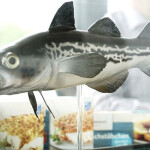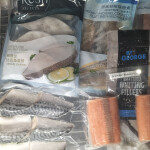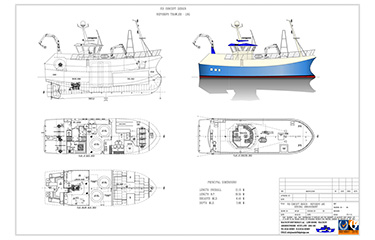Fisheries Innovation and Sustainability (FIS), a coalition of experts in the U.K. working to develop innovative technology for the fishing industry, has developed concept vessel designs that could help move the U.K. toward a net-zero fishing industry.
The report, and the concept vessels, are the result of a collaboration between Macduff Ship Designs, the University of Exeter’s Centre for Future Clean Mobility (CFCM), and FIS. The partnership developed six different “first-of-their-kind” designs for alternatively-powered fishing vessels its members said could bring the industry to net-zero carbon emissions.
The report and the project were initiated after an FIS-organized “Vessels of the Future” workshop in April 2022 explored net-zero fishing vessel options currently available in the marketplace. Soon after, FIS commissioned Macduff Ship Designs and CFCM to identify barriers to their adoption, and in a second stage of the project – supported by Marine Fund Scotland – the collaboration developed the vessels.
“The concept designs we provided for this report represent a feasible way for fishing vessels to transition away from diesel to a net zero alternative,” Macduff Ship Design Naval Architect Duncan Boag said. “Whilst we ensured that all the designs are viable from a development perspective, the report also highlights the significant challenges facing this transition that need to be overcome in order to achieve the goal of a net-zero fishing fleet.”
The report presented two different design concepts for three common fishing vessels in the U.K.: 10-meter creel boats, 15-meter nephrops trawlers, and under-24-meter whitefish trawlers. The designs analyzed several alternative fuel options, including battery electric, methanol, and liquid natural gas.
The report found numerous challenges to switching from diesel fuel, including technical challenges like equipment availability, changes in established infrastructure allowing vessels to refuel or recharge, and regulatory and financial barriers.
FIS Executive Director Kara Brydson said the study showed how difficult the push to move fishing fleets away from using diesel fuel will be.
“These designs show what could be possible for U.K. fishing vessels if we can address current financial, regulatory, and technical barriers,” Brydson said. “However, they do verify concerns raised in our earlier project – that vessel owners trying to do the right thing in switching to alternative fuels will, for now, be at a critical disadvantage competing in a market with diesel vessels.”
Past research showed no alternative fuels can be stored as efficiently as diesel, and all have more complicated tank, piping, and safety requirements. Furthermore, every altnerative propulsion method would potentially increase capital costs, the report found.
CFCM Director Chris Smith said the conceptual designs didn’t overcome many of those challenges, but they did give a clearer outline of what they were.
“Until now, it has not been possible to evaluate the practical implications of our work on optimized clean powertrain design on the performance and operation of vessels,” Smith said. “This groundbreaking work from Macduff Ship Design has shed invaluable light on the challenges of developing clean propulsion vessels, and highlights the necessary regulatory, operational, and infrastructure-related changes needed to make this work a reality.”
Image courtesy of Fisheries Innovation and Sustainability/Macduff Ship Designs







